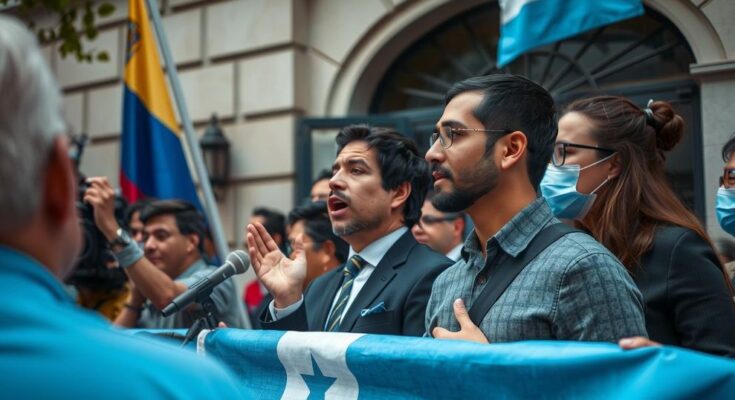Venezuelan opposition members seeking refuge in the Argentine Embassy in Caracas have been facing a dire situation, described as a ‘prison embassy’ by activist Magalli Meda, due to a prolonged power outage and threats from security forces. The Organization of American States condemned the siege, emphasizing the necessity of safe-conduct passes for the asylum seekers. This scenario reflects the broader human rights crisis in Venezuela amid escalating political tensions.
On Saturday, Venezuelan activist Magalli Meda reported that the Argentine Embassy in Caracas has been without electricity for 35 days. Six opposition members, who sought refuge under the protection of Brazil, have been effectively trapped within what Meda termed a “prison embassy.” This situation has been characterized as a serious violation of human rights. Amidst ongoing political tensions, Venezuelan President Nicolás Maduro and opposition candidate Edmundo González both claimed victory in the recent presidential elections. However, electoral authorities and the Supreme Court declared Maduro the official winner, while a Venezuelan court subsequently issued an arrest warrant for González due to allegations of criminal misconduct tied to the election. González fled to Spain with assurances of safe passage following negotiations between Venezuela and Spain.
The Argentine government has extended asylum to six opposition figures accused of conspiracy and treason, although their exit has been thwarted by the Venezuelan government. One of the asylum seekers, Fernando Martínez Mottola, recently left the embassy premises. Security forces from Venezuela have ostensibly besieged the Argentine Embassy, aiming to apprehend the asylum seekers, which González labeled a “permanent” siege. Notably, this siege has drawn the condemnation of the General Secretariat of the Organization of American States (OAS), emphasizing that the belligerent activities of armed personnel, alongside the severe disruption of basic amenities, create an imminent threat to the safety of those seeking asylum.
Additionally, the OAS has underscored the necessity for immediate issuance of safe-conduct passes for these individuals, viewing it as a critical obligation. The Vienna Convention on Diplomatic Relations mandates that the receiving State must provide adequate facilities for the conduct of diplomatic missions. Moreover, Article 5 of the Convention on Diplomatic Asylum emphasizes that asylum is to be granted in urgent circumstances and must ensure the protection of the asylee’s safety until departure.
The political landscape in Venezuela has been increasingly tumultuous, with accusations of electoral fraud undermining the legitimacy of the Maduro administration. The stark divide between the government and the opposition has resulted in the persecution of dissenters, prompting some to seek asylum abroad. Diplomatic asylum is governed by international treaties designed to safeguard individuals facing political persecution. Recent instances have shown embassies becoming sanctuaries for the persecuted, as seen in this case involving the Argentine Embassy and several Venezuelan opposition members. The situation highlights not only the domestic political crisis but also the international legal frameworks in place to protect those seeking refuge.
The ongoing siege of the Argentine Embassy by Venezuelan security forces raises critical concerns about human rights violations amid a politically charged environment in Venezuela. Activists like Magalli Meda underscore the dire conditions faced by asylum seekers, while the international community, including the OAS, calls for urgent intervention to protect these individuals. The complexities surrounding diplomatic asylum continue to evoke discussions on the obligations of states under international law. Without immediate action, the safety and rights of these opposition members remain endangered, underscoring the urgent need for a resolution.
Original Source: www.jurist.org




